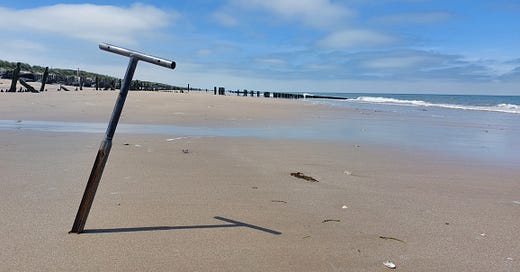Wetland round-up
- Keep up-to-date with the latest wetland and water related news, research and jobs. If you’d like to receive regular updates on all things wetland, please subscribe to this newsletter.
🧾 Wetland news & research 🧪
Record numbers of migratory birds in Lancashire wetland
Grimsargh Wetlands, located in the rural village of Grimsargh, Lancashire in the UK, was only created a few years ago, but has now seen a record number of Whimbrel using it. Whimbrel migrate from West African wintering grounds to breeding sites in Iceland each year, staging in the UK on their way north. Lancashire is a particularly popular county for staging birds, and it’s great to see their numbers increasing in this newly created wetland.
UK's largest wetland project passes halfway point
A major project to create one of the biggest reedbeds in the UK at a quarry site has passed the halfway point. Work to expand Ouse Fen nature reserve, north of Cambridge, started in 2001. The new wetland is being created by the phased restoration of Needingworth Quarry, where sand and gravel had been extracted for use by the construction industry. The reserve will grow to the size of nearly 980 football pitches by the end of the project.
Research backs beavers in fight against flooding and droughts
Research led by the University of Exeter and Devon Wildlife Trust in the UK, based on a 10-year study of wild-living beavers in Devon shows that the animals are having a positive impact on flood and drought alleviation. The study of four wild beaver territories in Devon found they store more than 24 million litres of water, their dams a can significantly reduce storm flows by an average of 30% during periods of heavy rainfall, and help to alleviate drought conditions. All fantastic news and shows the importance of a considered and managed reintroduction of beavers to the UK.
“Holy cow - there are mangroves in Georgia!”
Mangroves are coastal wetlands found around the equator. Their latitudinal range is restricted due to temperature, as they can’t cope with the cold. However, climate change is changing the average temperatures of our planet and mangroves are now creeping further north and south, potentially taking over saltmarsh habitats. This story is a great one about a group of clearly excitable scientists who find, for the first time, mangrove species growing in Georgia, USA. What this shift in range means for biodiversity, coastal erosion and carbon sequestration all needs to be looked at moving forwards.
River Yala basin roaring back to life after years of degradation
Wonderfully positive story about a restoration project along the River Yala, in Kenya, having a huge impact on the wildlife and communities in the region.
🌊Wetlands and D-Day
Top-secret D-Day mission that changed World War II unearthed by North Wales 'mud fanatic'
This is an unusual project I’ve been working on for a while. With the BBC I have made a documentary highlighting the importance of wetland science for the success of the D-Day landings. There will be a peer-reviewed paper and in-depth article on the subject coming out next week and the documentary, called ‘The Beaches’ will be broadcast on BBC Radio 4 on Sunday (June 2) at 1.30pm and then be on BBC iPlayer. Hopefully you’ll find it of interest!
An organisation that deserves a shout out for their help with the documentary is Royal Eijkelkamp and Eijkelkamp Fraste UK. They make specialist water and soil testing equipment, and after chatting to them they kindly agreed to make me a bespoke auger (soil corer) to match the kit that the commandos would have used. It really added a layer of authenticity to the whole programme.
💰 Wetland jobs
Project Officer: Ouse Washes Landscape Recovery Project - RSPB
Head of Freshwater: Maternity Cover - Wiltshire Wildlife Trust
Get in-touch 📢
If you’d like to get in-touch please follow Dr Christian Dunn on Twitter/X (@christiandunn) or Instagram (@drchristiandunn), or email c.dunn@bangor.ac.uk.
If you have an image, news item, research item, or job you’d like to share in this newsletter, please get in-touch.




